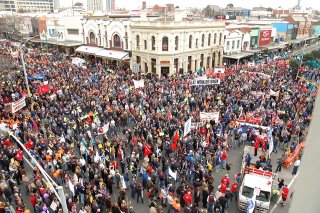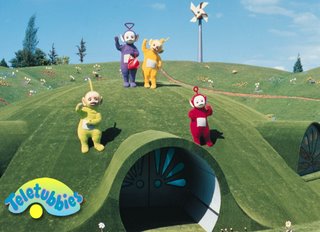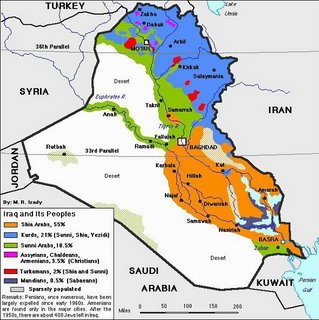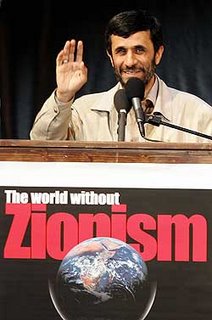 Thousands of protesters are expected to turn out today in capital cities across
Thousands of protesters are expected to turn out today in capital cities across Thursday, November 30, 2006
Save Your Energy for Election Day
 Thousands of protesters are expected to turn out today in capital cities across
Thousands of protesters are expected to turn out today in capital cities across Tuesday, November 28, 2006
We Know What's Good for You
 The problem with making policies these days is that most of the time, the public doesn’t know what’s good for them – and politicians are too busy ‘spinning’ to try and convince them otherwise. The example of nuclear power is topical at the moment, so let me start with that.
The problem with making policies these days is that most of the time, the public doesn’t know what’s good for them – and politicians are too busy ‘spinning’ to try and convince them otherwise. The example of nuclear power is topical at the moment, so let me start with that. Wednesday, November 22, 2006
Divided We Fall
 There are clear lessons to be learnt at the moment for our fledgling Administration from the behaviour of the opposition parties in both the
There are clear lessons to be learnt at the moment for our fledgling Administration from the behaviour of the opposition parties in both the Tuesday, November 21, 2006
It’s Happened Again
 Just when we thought it was safe to venture out in public again another of
Just when we thought it was safe to venture out in public again another of http://www.youtube.com/watch?v=UomfLKQr57U&NR
Friday, November 17, 2006
Just Sign it Already
 World leaders met in
World leaders met in
Wednesday, November 15, 2006
Viable Alternatives

One of the strongest arguments for my Presidency and corresponding Republic is that a career in politics tends to suck the creativity, honesty and life itself out of those who commit to it. This creates a situation where charismatic leadership is harder to find than justice at
In NSW, as well as federally at the moment, this situation is all too apparent. Morris Iemma’s Labor government seems to be self destructing in recent weeks, with the sackings of Police Minister Carl Scully (after repeatedly misleading parliament) and Aboriginal Affairs Minister Milton Orkopoulos (on child sex charges). The cloud of corruption surrounding state Labor has continued to darken after allegations of domestic violence against (
Tuesday, November 14, 2006
A Solution for Iraq
 I know we’re on the other side of the world to
I know we’re on the other side of the world to As radical as it may seem, dividing the country along ethnic lines, into a Kurdish north, Shia South and Sunni West, may prove to be an effective way to quell the sectarian fighting that is gripping the country. This would be best achieved while coalition forces are on the ground, to minimize the ethnic cleansing that has been associated with redrawing ethnic borders in the past. In effect, the Kurdish people are already self-governed and the Shia’s in the south are beholden to
Thursday, November 09, 2006
Trust me, Johnny
 Since this Administration has been formed, we’ve been pushing pretty hard at some controversial issues that both the current political parties seem to avoid. We’re anti-bogans and
Since this Administration has been formed, we’ve been pushing pretty hard at some controversial issues that both the current political parties seem to avoid. We’re anti-bogans and Dems Win
 The world’s most powerful democracy went to the polls yesterday to elect a new House of Representatives and a third of its Senate. As the majority of the counting concluded in the early hours of this morning, the Democrats had emerged as the big winners and the big theme of the election was one of change. In the 2002, Bush’s Republican Party gained control of both houses, and has wielded unchecked power for 4 years. Disillusioned citizens sent a clear message that they disliked the way this power was being used, returning the House to the Dems (229-196 with 10 undecided) and possibly the senate too (50 – 49 with 1 undecided).
The world’s most powerful democracy went to the polls yesterday to elect a new House of Representatives and a third of its Senate. As the majority of the counting concluded in the early hours of this morning, the Democrats had emerged as the big winners and the big theme of the election was one of change. In the 2002, Bush’s Republican Party gained control of both houses, and has wielded unchecked power for 4 years. Disillusioned citizens sent a clear message that they disliked the way this power was being used, returning the House to the Dems (229-196 with 10 undecided) and possibly the senate too (50 – 49 with 1 undecided). Monday, November 06, 2006
Keep God on the Side

Every so often the media will pick up a horrifying story of the public stoning of an adulterer, the de-handing of a thief, or the lashing of some other petty criminal. Most often these reports come from a mysterious Arab country that sounds familiar, but that your average Today Tonight viewer could never find in their atlas (you know, that book with all the maps in it).
Friday, November 03, 2006
Genocide isn't Funny

Has anyone else had enough of